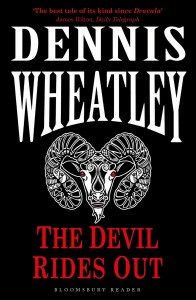By Dennis Wheatley
Bloomsbury Reader
ISBN: 978-1448213009
2013; $15.00 trade paperback; $7.99 ebook
Reviewed by Andrew Byers
One of Dennis Wheatley’s most famous novels, THE DEVIL RIDES OUT is a supernatural thriller originally published in 1934, and the first of Wheatley’s so-called “Black Magic” novels that explore a series of confrontations between Satanists and those seeking to stop them. It has just been republished as part of a new set of attractively bound trade paperback reprints by Bloomsbury Reader. While Wheatley wrote a large number of very popular thrillers and adventure novels, this was the first of his works to explicitly deal with the occult. It’s a doozy, full of plenty of action and occult menace, though it’s also what I would describe as a “mannerly” thriller, depicting the actions of a clique of genteel aristocrats and upper-crust Brits.
THE DEVIL RIDES OUT picks up shortly where one of Wheatley’s earlier novels, THE FORBIDDEN TERRITORY, leaves off, and the early pages of DEVIL reference the earlier events. I’d say that it isn’t necessary to have read FORBIDDEN before this one, but reading the earlier work certainly would expand the characterization of the protagonists and make them seem much more fully fleshed out. Wheatley’s recurring protagonists include: the elderly but still spry French exile, the Duc de Richleau, who knows a great deal of occult lore and leads the group in opposing the Satanic cult; the wealthy Jewish banker, Simon Aron, who is in way over his head and has inadvertently fallen under the sway of evil; the brash young American adventurer, Rex Van Ryn, who falls in love with a mysterious young woman named Tanith, a psychic of great power and a member of the Satanic cult; and well-connected, upper-crust Brit, Richard Eaton, a skeptic about the occult who has settled down to life with his new wife and infant daughter.
The novel opens simply enough: Richleau and Rex discover that their friend Simon Aron has become involved with a Satanic cult led by the charismatic sorcerer and high priest Mocata. To Simon, his involvement began as just dabbling in the occult, but it’s quickly become apparent that he features prominently in Mocata’s plans, and is destined for a bad end (and by that, I mean, drained of his wealth, mystically mind-controlled to commit unspeakable acts, and eventually sacrificed). The situation is complicated by the fact that Mocata wields true supernatural power – this isn’t just a matter of lunatics playing around with meaningless rituals, but people who are capable of working actual spells, summoning demons, and the like. Wheatley is not coy about how the supernatural – and specifically black magic – is represented here: magic is real, the Devil is real, and he is capable of actively intervening in the world when called upon to do so by his followers. Richleau is the only one of the heroes to have any knowledge of the supernatural, while the rest have to witness the power of black magic before they’re convinced that anything supernatural is going on. I don’t want to spoil the plot’s twists and turns, but I will say that it’s a mix of adventure and occult horror that’s ultimately more thriller than pure horror. There’s a genuine sense of menace throughout though, and very real stakes: innocent lives are at stake, with the penalty for failure by the protagonists being the triumph of truly depraved evil-doers and the ritual murder of a child.
Some critics have complained that Wheatley occasionally uses too much exposition (coming from the mouths of his protagonists) to convey the fruits of his research on magic, occult lore, esoteric practices, and the like. Those passages are present here, and occasionally slow down the plot a bit, but I think they only serve to enrich the story and add a touch of verisimilitude to the proceedings, even if the delivery may come off a little forced at times.
I should also note that the book was the loose inspiration for the eponymous – and notorious – Hammer Horror film from 1968 (screenplay by the late, great Richard Matheson), starring Christopher Lee in a fine performance as the Duc de Richleau. If you’re a fan of Hammer films, you probably owe it to yourself to read the original novel, even though its plot only bears a superficial resemblance to the film.
Certainly recommended, if only so you can see what all the fuss is about when it comes to the iconic Black Magic novels of Dennis Wheatley. This is a good entry point to Wheatley’s fiction. It’s fast paced, and while it’s not a gorefest, it holds up very well against other pulp adventures, especially if you’re looking for an occult.









